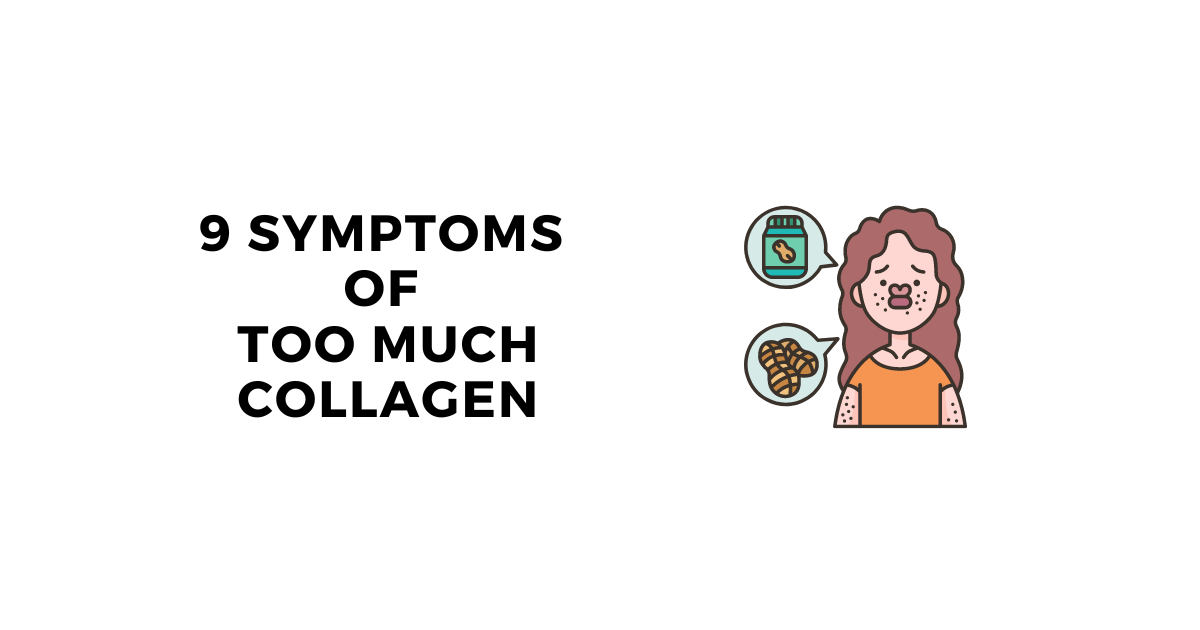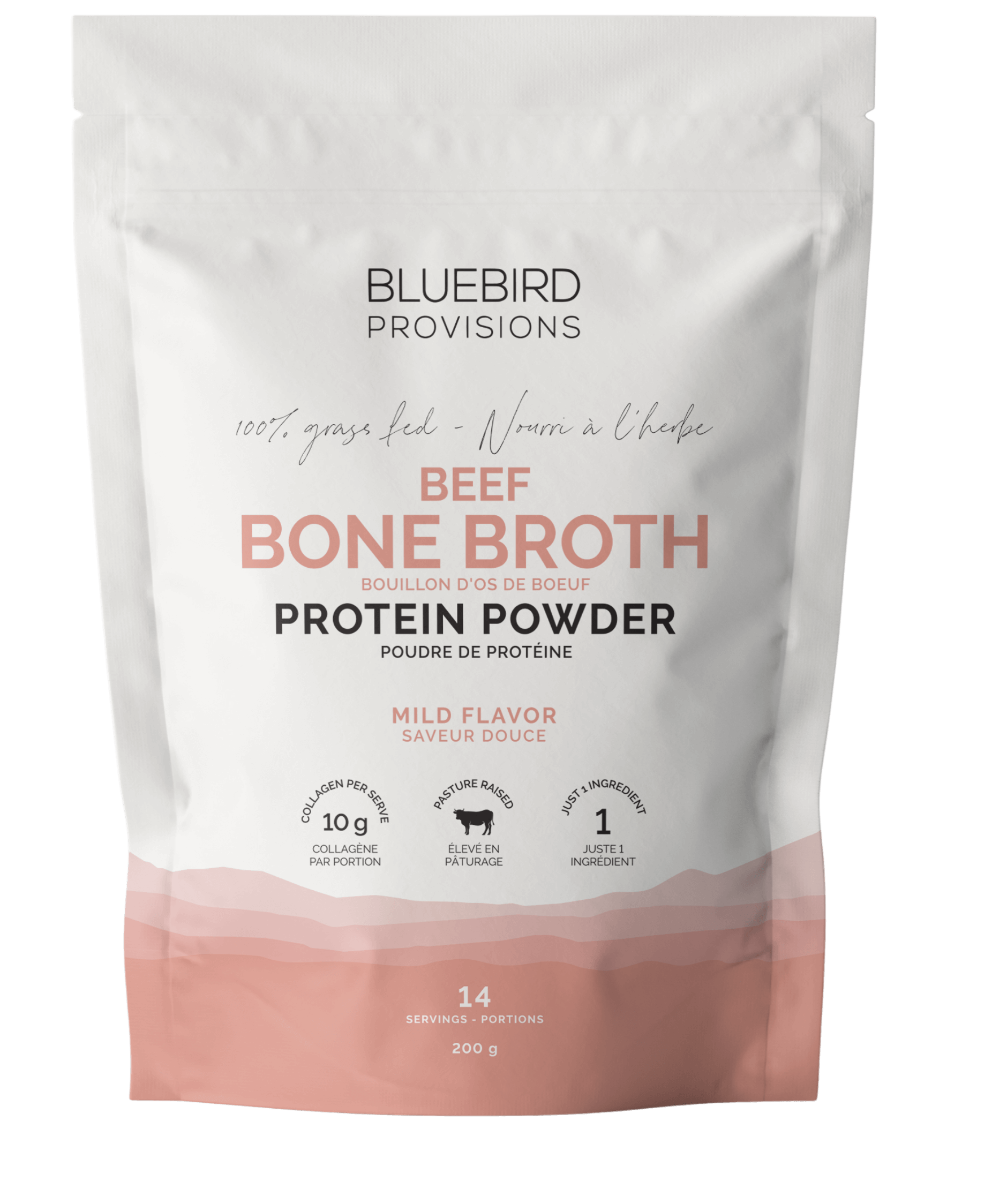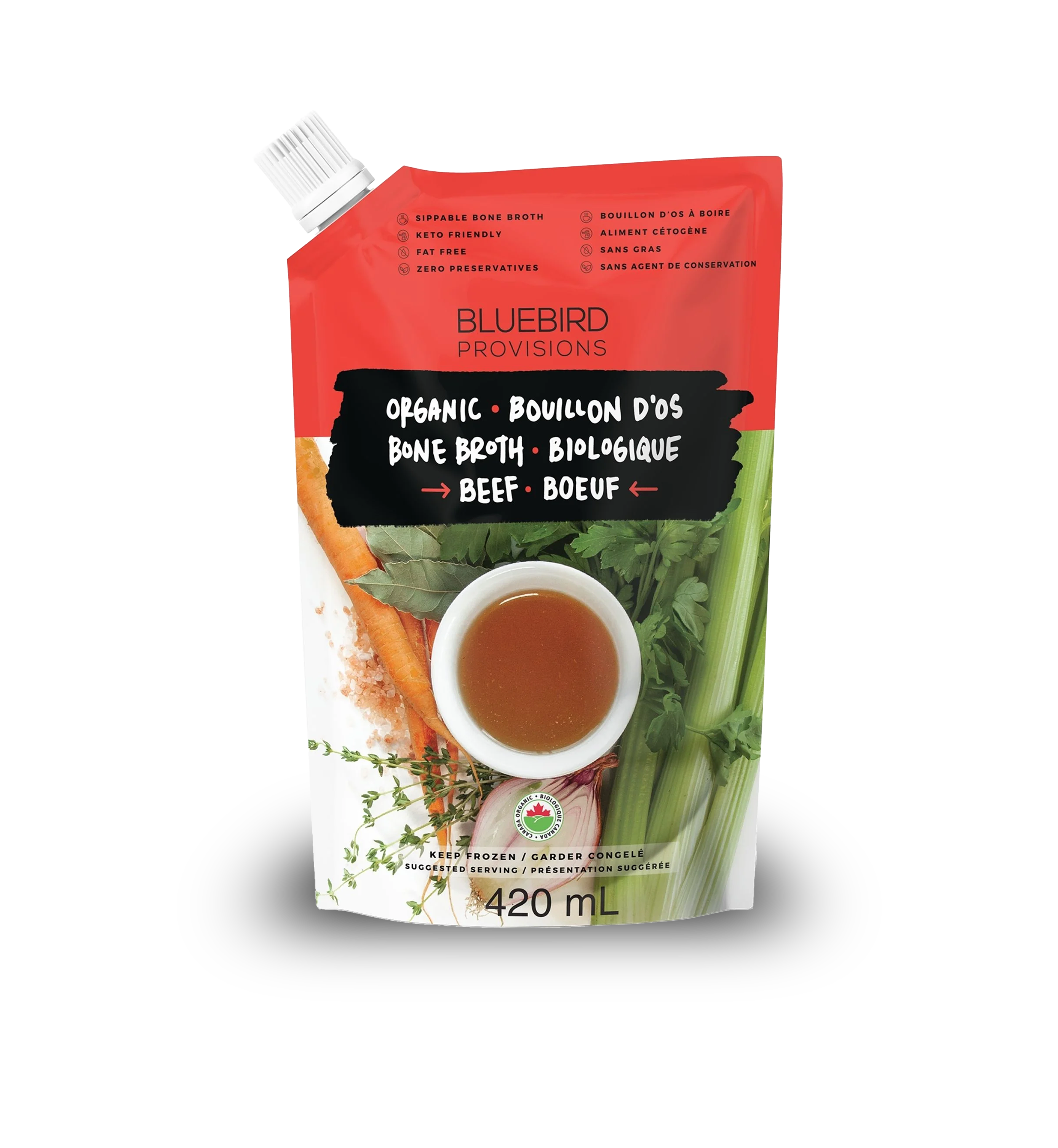
Too Much Collagen Symptoms: 8 Fast Treatment Options to Try Today
Symptoms of Too Much Collagen
As someone who has taken too much collagen in the past and experienced the nasty symptoms firsthand, I wanted to learn about the potential risks with taking it.
I didn’t want to stop taking collagen altogether. Collagen supplements have become increasingly popular for their numerous health benefits. I’ve never had better hair or skin than when taking a collagen supplement.
That being said, some things went wrong for me, and I didn’t want to make another mistake. That’s why I took some time to research everything that can happen when you take too much collagen.
I also discovered exactly how much is the right amount of collagen to get health benefits without negative consequences.
Whether you're a long-time user of collagen supplements or considering incorporating them into your routine, this article will outline the symptoms and at home treatment options to help you make informed decisions about your health.
Can You Take Too Much Collagen
You can absolutely take too much collagen, but it is really about too much too soon. If you take more collagen than your body is accustomed to, then you will get some nasty side effects like bloating, diarrhea, allergic reactions or even liver and kidney issues.
From a practical point of view, start out with a very low dose of 5 grams per day and see how you feel after a few days. From here you can increase the dose.
Can too much collagen cause scleroderma?
It is unlikely that too much collagen causes scleroderma, but it is possible. Scleroderma is an autoimmune disease that affects the body's connective tissues, including collagen.
According to a 2022 study in in Statspearls, your immune system mistakenly attacks healthy tissues, including those that produce collagen, leading to excessive production of collagen in the skin, blood vessels, and internal organs (1).
While collagen is a major component of the connective tissue affected by scleroderma, it is not likely to be the cause of the disease.
The problem is that the immune system attacks the body, including collagen, leading to excess collagen. There’s not really a reason to think that excess collagen in the body would lead to this condition.
Scleroderma is believed to be caused by a combination of genetic, environmental, and immune system factors. There is no evidence to suggest that consuming or using collagen supplements or products can cause scleroderma.
Symptoms of Taking Too Much Collagen
Symptoms of taking too much collagen are scleroderma, kidney stones, hypercalcemia, nausea, bloating ,allergic reactions and possible weight gain.
Let's go through each of these below to see which ones you need to worry about.
1. Scleroderma Face Rash: Auto Immune Condition
While some symptoms of taking too much collagen supplements may overlap with those of scleroderma, overdoing it with collagen probably doesn’t cause scleroderma.
Scleroderma is an autoimmune disease that can affect various parts of the body, including the skin, blood vessels, and internal organs, and is caused by a combination of genetic, environmental, and immune system factors.
Scleroderma, on the other hand, is characterized by thickening and hardening of the skin and connective tissues, as well as damage to internal organs such as the lungs, heart, and kidneys.
The symptoms of scleroderma can vary depending on the type and severity of the disease, but common signs include skin tightening, joint pain and stiffness, difficulty swallowing and shortness of breath.
While there is no cure for scleroderma, treatments can help manage symptoms and slow the progression of the disease. It is important to consult with a healthcare professional if you experience any symptoms related to scleroderma or have concerns about excessive collagen consumption.
2. Collagen Side Effects on Kidneys
Excessive consumption of collagen supplements may potentially increase the risk of developing kidney stones, although this is a relatively rare occurrence.
Collagen is composed of amino acids, including hydroxyproline, which is metabolized into oxalate, a component of some kidney stones.
Therefore, consuming large amounts of collagen supplements may increase the amount of oxalate in the body, potentially leading to the formation of kidney stones.
Other factors that can contribute to the formation of kidney stones include dehydration, high intake of sodium or animal protein and certain medical conditions.
Symptoms of kidney stones can include the following:
- Severe pain in the back, side or lower abdomen
- Nausea
- Vomiting
- Difficulty urinating
It is important to note that the risk of kidney stones from collagen supplements is relatively low, and most people who consume collagen supplements do not experience any adverse effects.
However, it is always important to talk to a healthcare professional before starting any new supplement regimen, especially if you have a history of kidney stones or any other medical conditions.
To minimize the risk of kidney stones, make sure that you stay well-hydrated, limit sodium and do all the basics you hear from everyone else: maintain a healthy diet and lifestyle.
3. High Calcium Levels: Hypercalcemia
Excessive consumption of collagen supplements may potentially lead to high levels of calcium in the blood, a condition known as hypercalcemia.
Why is this the case?
Well we don't know for certain, but we do know that collagen supplements can have high amounts of calcium especially compared to bone broth vitamin and mineral levels.
Taking too much of these supplements can lead to an overabundance of calcium in the bloodstream.
Symptoms of hypercalcemia can include
- fatigue
- weakness
- nausea
- vomiting
- constipation
- confusion
- increased thirst and urination (2).
Severe cases of hypercalcemia can also lead to kidney stones, bone pain, and other complications.
According to a data from a 2022 in The Journal of the American Medical Association, the risk of hypercalcemia from collagen supplements is relatively low. 95% of people who consume collagen supplements do not experience any adverse effects (2).
You can always talk to your doctor before taking it if you are not comfortable.
To minimize the risk of hypercalcemia, it is also important to stay within the recommended dosage of collagen supplements and to maintain a balanced and healthy diet.
If you are at risk then I would consider avoiding some calcium rich foods like dairy, leafy green vegetables and fortified foods.
4. Nausea, Diarrhea and GI Effects
Some people may have difficulty digesting or absorbing the collagen due to underlying digestive issues or allergies.
Also, if you are sensitive to certain animal sources like chicken, fish, pork or bovine (cows), then you also might be sensitive to it.
But the big thing here is the risk of too much. Taking high doses of collagen supplements too soon may irritate the lining of the stomach and intestines, leading to symptoms such as nausea, diarrhea, abdominal cramping, and bloating.
More is not always better. A good friend of mine was hoping to fix joint pain by taking 40 grams per day. He got extreme bloating (see below) and diarrhea that he had to stop altogether.
It is important to note that not everyone who takes collagen supplements will experience GI distress, and symptoms can vary depending on the individual and the amount consumed.
To minimize the risk of GI distress I would recommend the following to you:
- Start with a low dose.
- Gradually increase the dosage over time.
- Always take supplements with food and plenty of water to aid digestion.
Choosing high-quality collagen peptides from reputable sources can also help ensure that the supplements are free from contaminants and other harmful substances that can cause GI distress.
You can get the all the benefits of collagen and more by using a high protein bone broth. My favorite one is the Bluebird Provisions chicken bone broth.
5. Bloating from Collagen Supplements
Collagen supplements can cause bloating for the same reasons as collagen supplements can cause nausea, diarrhea and GI distress. Some people won’t have such serious gastrointestinal upset while others may just feel a bit bloated.
Some people may have difficulty digesting or absorbing collagen due to underlying digestive issues or allergies.
As I mentioned above, high dose tend to mess with the mucosal lining in your stomach and intestines, leading to symptoms such as bloating, abdominal discomfort, and gas.
To minimize the risk of bloating, start with a low and gradually increase the dosage over time.
6. Allergic Reactions
Taking too much collagen can cause allergic reactions in some people, especially if you have a known allergy to collagen or to any of the other ingredients in the supplement.
Also, if you've previously had a reaction then you'll likely have one when taking higher doses of collagen, since your digestive system is being exposed to more of it.
Symptoms of an allergic reaction can include itching, hives, swelling of the face, lips, tongue or throat, difficulty breathing, and other respiratory problems.
Severe allergic reactions, known as anaphylaxis, can be life-threatening and require immediate medical attention. If you have any of these then see your doctor immediately.
Allergic reactions to collagen supplements are relatively rare. Since collagen is in so many foods, you’d likely know if you had an allergy to it.
To minimize the risk of allergic reactions, you should follow the checklist in my bone broth with collagen article. Much of it will apply to these supplements as well.
7. Increased Weight and Body Mass
Overdoing it will collagen can cause weight gain and an increase in body mass if you are actively exercising. You'll want to read the article for a full overview, because the reasons may shock you.
Turns out that collagen works quite well for building bones, connective tissue and muscle that it can contribute to weight gain.
Keep in mind you'd have to take it over a long period of time to notice these effects. Otherwise, a 2019 study actually suggest that collagen may promote weight loss (3).
How is that for confusing?
It is important to note that the effects of collagen supplements on body weight and composition may vary depending on the individual and other factors such as diet, exercise habits and lifestyle.
How to treat symptoms caused by having too much collagen?
You can treat the symptoms of too much collagen by doing the following:
- Consult with a doctor: If you are experiencing symptoms that may be related to having too much collagen, it is important to consult with a healthcare professional.
- They can evaluate your condition, determine the underlying cause of your symptoms, and recommend appropriate treatment options.
- Reduce intake of protein: If you suspect that you are taking too much and it may be causing your symptoms then try reducing your intake of protein, including collagen supplements
- This can help to restore a balance of nutrients in your body and reduce any excess protein buildup.
- Take vitamin C and E supplements: These vitamins are antioxidants that can help to reduce inflammation and promote healthy collagen production.
- Taking supplements can help to support your body's natural healing processes and reduce the symptoms caused by excessive collagen.
- Use anti-inflammatory medications if needed: In some cases, anti-inflammatory medications such as ibuprofen or aspirin may be recommended to reduce pain, inflammation, and other symptoms associated with excessive collagen.
- Keep in mind I do not recommend these except in extreme cases. They can often do more harm than good if taken regularly over a long period of time. Consult your doctor.
- Treat any associated conditions: If your excessive collagen is caused by an underlying medical condition such as scleroderma or lupus, treating the underlying condition may help to reduce your symptoms.
- Get enough sleep: Adequate rest and sleep are essential for your body's natural healing processes. Make sure to get enough rest and take steps to improve your sleep quality.
- Avoid stress: Stress can contribute to inflammation and other symptoms associated with excessive collagen.
- Taking steps to manage stress, such as practicing relaxation techniques or getting regular exercise, may help to reduce your symptoms.
- Eat a balanced diet: Eating a balanced diet can help to support your body's natural healing processes and reduce inflammation.
- Make sure to eat plenty of fruits and vegetables and limit your intake of inflammatory processed foods and added sugars.
What is the recommended dosage of collagen supplements?
Most collagen supplements have a suggested daily dosage printed on the packaging, but you can also refer to the following:
- Powdered supplement packaging often suggests taking 1–2 scoops or 5-15 grams daily
- A pill or gummy supplement may recommend 1–2 pieces which is 5 grams or 50% of what you might get from a scoop of powder.
Read my article on how much collagen per day is best for your specific health goal.
As always, talk with your doctor to determine the right level of collagen supplementation depending on your health goals.
Are collagen supplements safe for people with kidney disease?
Collagen supplements are generally safe for most people, including those with kidney disease. The role of collagen in kidney disease is complicated and still requires more research to uncover (5).
But it doesn’t appear that taking a collagen powder would have a negative impact on the disease. That said, it may not be best to stress your kidneys with excess protein without good reason.
People with kidney disease may have impaired kidney function, which can make it more difficult for their bodies to filter waste and excess nutrients, including protein.
Collagen is a type of protein, so taking too much collagen supplementation may increase the amount of protein in the body, putting additional strain on the kidneys.
In some cases, taking high doses of collagen supplements may also increase the risk of developing kidney stones.
You should know that these products are often made from animal sources, which contain high levels of calcium and other minerals that can contribute to the formation of kidney stones.
To minimize the risk of adverse effects, you should talk to their healthcare provider.
Your healthcare provider can evaluate your kidney function and provide guidance on whether or not they are safe for you to take, and at what dosage.
If you have kidney disease and are interested in the benefits of collagen, it is important to choose a high-quality one. Or else just drink bone broth instead because it has all the benefits without the extra calcium.
Are there any treatments available to help reduce the symptoms of too much collagen?
The excessive accumulation of collagen can occur in various conditions such as scleroderma, keloids, and hypertrophic scars (6).
While there is no specific treatment to reduce collagen levels, there are treatments available to manage the symptoms associated with excessive collagen.
For example, in scleroderma, medications such as immunosuppressants, vasodilators and corticosteroids may be used to alleviate symptoms such as skin tightening, joint pain, and organ damage.
In keloids and hypertrophic scars, treatments such as corticosteroid injections, cryotherapy, and laser therapy can help reduce the appearance and improve the symptoms (7).
It is important to note that the effectiveness of these treatments varies depending on the underlying condition and the severity of symptoms.
As always, I would consult with a healthcare professional for personalized recommendations and treatment options.
Can you overdo taking collagen?
I’m still an avid user of collagen supplements because of the numerous health benefits associated with it, including promoting healthy skin, hair, and nails.
However, I overdid it before and now I’m very careful to take only the recommended dose.
At first, I noticed that I was feeling nauseous frequently. I also started feeling tired all the time and was going to the bathroom every hour.
I went to the doctor and had some tests done, and was stunned to learn that my symptoms were likely related to the high levels of calcium that I was taking with the collagen, as well as problems with my stomach lining because the collagen was irritating it.
I was advised to stop taking collagen supplements until the calcium levels equalized and my stomach lining healed.
It was a wake-up call for me to be more mindful of the supplements I take and their recommended dosage. I now drink a delicious chicken bone broth instead because it gives me a whole food source of collagen without the risks.
Closing Thoughts
In conclusion, yes, it is possible to overdo taking collagen. If you don’t want hypercalcemia and nausea like I had, follow the recommended dosage and consult with a healthcare provider before starting any new supplement regimen.
If you want a safe alternative, try a delicious bone broth like the one from Bluebird Provisions.
Do you have any questions about collagen or the issues you are having? Leave a comment and I will do my best to get back to you asap.
Sources
- https://www.ncbi.nlm.nih.gov/books/NBK537335/
- https://pubmed.ncbi.nlm.nih.gov/36282253/
- https://pubmed.ncbi.nlm.nih.gov/30681787/
- https://pubmed.ncbi.nlm.nih.gov/33236192/
- https://pubmed.ncbi.nlm.nih.gov/1122925/
- https://pubmed.ncbi.nlm.nih.gov/9889433
Disclaimer: this information is for educational purposes only and has not been evaluated by the FDA or CFIA. It is not medical advise. It is not intended to diagnose, treat, cure, or prevent any disease or healthcare issue. Please consult your primary care physician for advise on any of this.





















8 comments
My face started to look bloated leaving my face too full. I stopped taking the collagen supplements due to my skin thickening and regret it. My face was much more delicate before.
Shannon
Sorry to hear about the issues Anita. I would stop taking it for a few weeks and see how you feel. If you are back to normal then you know it is the collagen.
let me know how it goes!
connor
Connor at Bluebird Provisions
Hi Trina,
So sorry to hear about your mother. If it were my mother, I would tell her to stop taking it immediately.
connor
Connor at Bluebird Provisions
My mother-in-law is 84 years old and has been taking 38 grams a day or more of ancient nutrition with protein for over 4 years. It is making her sick. Please help. I read you only need 2-5 grams a day.
Trina
I have been putting a scoop of Collagen Peptides Powder Type 1 & 3 in my cereal for 10 days till I had severe diarrhea one morning. As that hadn’t happened to me in years, I wondered if it could be the Collagen so I did some research and found out it could be the reason. Should I try using half a scoop or stop taking it?! Please advise!
Anita
Thank you for your article… over the past 6 weeks I started having digestive problems and gastric burning issues causing extreme nausea and diarrhea… so concerned I started researching and realized that about 7 weeks ago is when I started taking 400 mg collagen a day! I’ve stopped the collagen and hopefully will feel better soon
The symptoms have had me scared for my life! And I’ve never had stomach problems before!
Susan
Thank you, it was interesting its so difficult to find information on different types of collagen and how it relates too scleroderma or Crest syndrome. I took collagen supplements for a couple of years to get nicer skin and then developed scleroderma or Crest syndrome and yet I have no family history of autoimmune disease. In my case its my digestive system that’s been messed up. I do worry that in the future many people will suffer as I did and it takes a long time to prove something like this. I would love any research links you have as I am trying to get better again without medication.
Lisa
THANK YOU FOR YOUR ARTICLE. I DID INCREASE MY COLLAGEN TO TWO SCOOPS 10MG THEN THREE SCOOPS OR 15MG AND FOUND I WAS JUST TIRED ALL THE TIME.
HAVE MORE GASTRIC DISTRESS, DIAHREA, AND A FEELING OF MALAISE.
I DECIDED TO RESEARCH SIDE AFFECTS AND ALL MY PROBLEMS INDICATE I MAY BE TAKING TOO MUCH, SO I STOPPED TAKING AND WILL SEE IF I FEEL BETTER.
THANK YOU FOR YOUR ARTICLE.
M HUISKES
Leave a comment
This site is protected by hCaptcha and the hCaptcha Privacy Policy and Terms of Service apply.